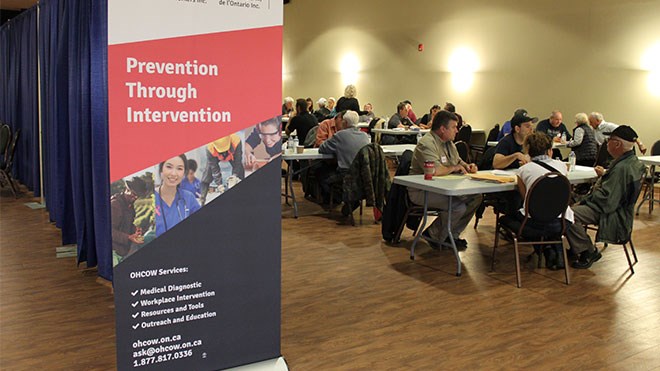Barry Duff doesn’t mince words about inhaling finely ground aluminum while working as an underground miner in Elliot Lake in the 1970s.
“Absolutely terrible,” he said. “It was like being in a gas chamber.”
At the time, McIntyre Powder, developed in Timmins, was thought to be a preventive measure against silicosis, and mine executives made inhaling it before the start of a shift a condition of employment for all underground employees.
So, at the start of every workday, Duff and his fellow workers would sit for 10 to 15 minutes in a tunnel leading to the headframe at the Quirke II uranium mine inhaling the dust. Miners would cough and spit it out, gasping for air, Duff said. But their protests went unheeded.
“If you got up and wandered out or wanted to leave, they would tell you, ‘Sit down, and you’re going to breathe this for 10 to 15 minutes or we’re going to fire you,’” Duff said. “And if you got up and went out they would fire you.”
Today, Duff wonders if his experience with McIntyre Powder is related to his failing memory. And he’s not alone.
On Oct. 3 and 4, miners from across the North are attending the McIntyre Powder Intake Clinic at the United Steelworkers (USW) Hall on Brady Street to share their stories and experiences of inhaling the powder.
Hosted by the USW — in co-operation with the Occupational Health Clinics for Ontario Workers (OHCOW) and the Office of the Worker Advisor (OWA) — the clinic is aiming to gather miners’ information into a database, with the goal of pursuing more research and eventually getting compensation for those miners who were impacted.
It’s a huge undertaking. McIntyre Powder was disseminated between 1943 and 1979 at mines across Canada, the U.S. and other parts of the globe. The practice was finally abandoned by 1980, but there’s been no follow-up research about its long-term effects on the miners who inhaled the dust.
To date, there’s been little scientific evidence to link exposure to aluminum dust with neurodegenerative diseases like Alzheimer’s, Parkinson’s or amyotrophic lateral sclerosis (ALS), noted J.P. Mrochek, a worker representative with the USW Local 6500. But the clinic is the starting point for exploring that theory.
“The only scientific literature we could find on aluminum dust is that aluminum dust never protected against silicosis,” Mrochek said. “So the question is: did it cause other health issues? That’s what we’re here to find out.”
A clinic intake can take two to three hours, as participants are guided through stations where they can share their work experience and exposure profiles.
The clinic is open to retired miners, miners who are still working, and the families of miners who are deceased.
For Janice Martell, hearing the stories of the miners is just as important as furthering the research.
Martell began looking into McIntyre Powder in 2011, after her father, Jim Hobbs, was diagnosed with Parkinson’s disease. Her dad’s claim for compensation with WSIB — which cited aluminum exposure as a cause for his neurodegenerative disease — was denied, but she’s continued her work as a “justice project.”
She now has more than 300 miners’ names on a volunteer registry, and has played an integral part in bringing the intake clinic to fruition.
“There is no group in history ever — and nor will there ever be again — that was exposed to aluminum in this way,” she said. “It was specifically ground to a specific micron level so it would get deep into the lungs on the unproven theory that it would prevent silicosis.”
The first McIntyre Powder Intake Clinic was held in Timmins in May, where 150 participants were registered. Martell expects more than 200 for the Sudbury clinic.
This has become an intensely personal project for Martell, who has come to know most of the participants on her registry as family. That something is finally being done to acknowledge their sacrifices gives her a renewed sense of purpose.
“They’re adding their voices here, and it feels like they’re not going to die in vain,” she said. “It feels like they’re going to get recognized for what they do.”
The McIntyre Powder Intake Clinic will take place on Oct. 3 and 4, from 8 a.m. to 8 p.m., at the Steelworkers Hall on Brady Street. Walk-ins are welcome.
More information about the McIntyre Powder Project is available at www.mcintyrepowderproject.com or 1-800-461-7120.




